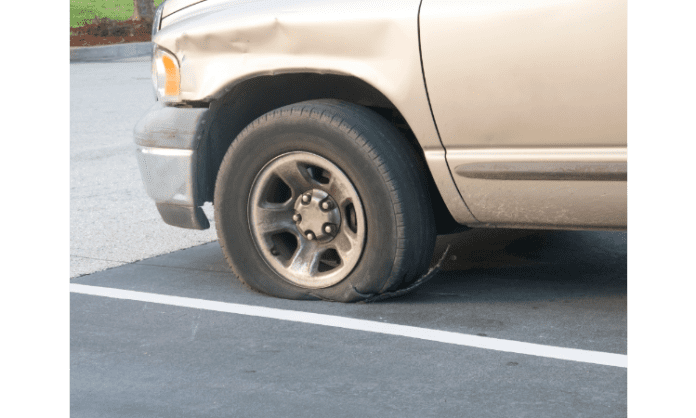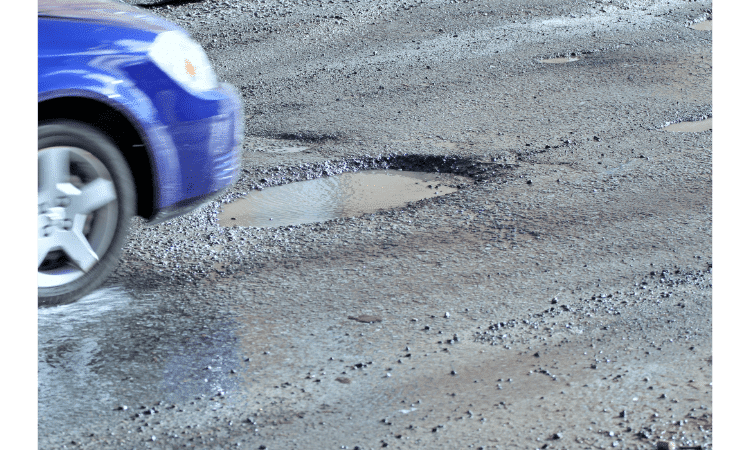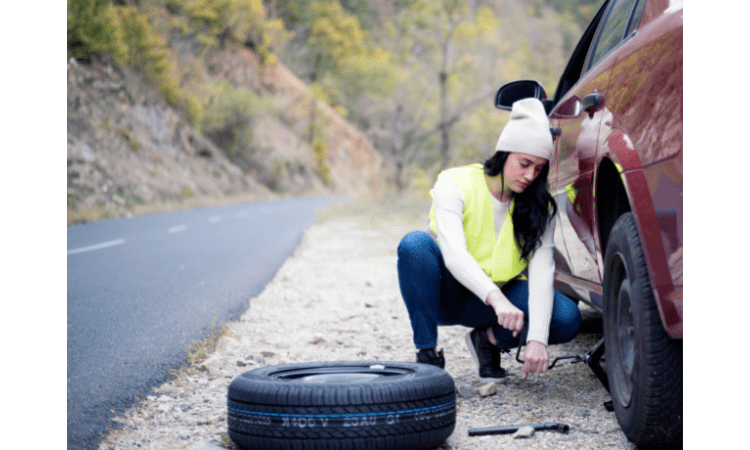
If there is one thing that can ruin a road trip, it’s experiencing a tire blowout. This isn’t just an inconvenience; this can be dangerous. While you probably don’t have to worry about your tires exploding unless you’re driving in the desert, you do need to know how to deal with sudden punctures and air leaks. Fortunately, there are ways you can help prevent these issues.
Maintain the optimal air pressure in your tires.

Tire pressure is the single most important aspect of tire safety. By maintaining your tires at the optimal PSI, you can ensure their longevity and ensure that they’ll perform as intended when you need them to. The proper air pressure for your vehicle is listed on a sticker in the driver’s side doorjamb or glovebox lid.
The only time to check your tires’ air pressure is when they are cold; don’t do it after driving because heat from driving causes expansion and thus higher pressures in all four tires. Also, be sure to use an accurate tire gauge, as different gauges will read differently even if they’re both within tolerance for accuracy.
Rotate your tires.

Rotating your tires is a simple, cost-effective way to extend the life of your car. How often you rotate them depends on how much mileage you drive and where. If you’re driving long distances frequently, it’s likely that your front tires need rotating more often than your rear ones.
If you notice uneven wear on any of your tires or if they seem like they’re wearing out rapidly, get them checked by a professional right away—you may have other issues going on with the vehicle that could cause blowouts.
Ensure vehicle has tires with proper load index and speed rating.
You can prevent tire blowouts by ensuring your vehicle has tires with the proper load index and speed rating. Tires should be replaced in sets of four, as the vehicle was designed to handle it that way. If a tire is worn out or damaged and needs to be replaced, it’s a good idea to replace all four tires at once. Old tires can also be dangerous if they have been recalled; some recalls require that you replace all four tires at once regardless of whether or not they are worn out.
Be careful driving.

- Avoid potholes. Potholes are notorious for causing blowouts, especially when they’re filled with water or ice.
- Avoid sharp turns. Sharp turns can also cause blowouts because the tire is forced to spin faster than it should, which leads to the rubber being worn down too fast and making the tire more likely to fail.
- Avoid driving over curbs. Curbs are another one of those things that cause tires to wear out quickly and easily puncture them if you hit them at high speeds (which you shouldn’t be doing anyway!).
- Avoid driving over sharp objects like rocks or glass shards on roadsides as well; these can really damage your tires if they happen to be in contact with them while you’re driving fast enough for them to come into contact with whatever’s in front of them! This includes snow drifts from storms as well–be wary of these since they could potentially cause a blowout if you hit one too hard and take off all your treads at once!
Get new tires before it’s too late.

You can’t see it, but your tires are at work every single time you drive. They’re the only part of your vehicle that touches the road and affects how safe, comfortable and efficient it is to drive. Tires help keep you on track as well as keep you from veering out of control when driving around turns or avoiding hazards like potholes or slippery roads in rain or snow.
Tires have a lot on their plates, but they’re up for the challenge—if they’re properly maintained! Regular tire maintenance goes beyond just checking for wear and tear; you should also inspect them for signs of damage such as punctures or blowouts before getting into any trouble out there on wheels! But if a blowout does happen (and they do happen), remember: take care not to skid while pulling over so that other drivers aren’t affected by smoke coming off the burning treads left behind after an accident has taken place (which could cause further accidents).
Conclusion
The bottom line is that tire blowouts are always a possibility, but the above tips can help you avoid them. And remember, if you do experience a blowout, try to stay calm and follow any advice you find in your vehicle’s manual. With preparation and awareness of what to do if the worst happens, it’s not too difficult to prevent or deal with a car accident!











